~ # ~
BIBLE MYSTERIES -
the Mystery of
NOAH
~ # ~
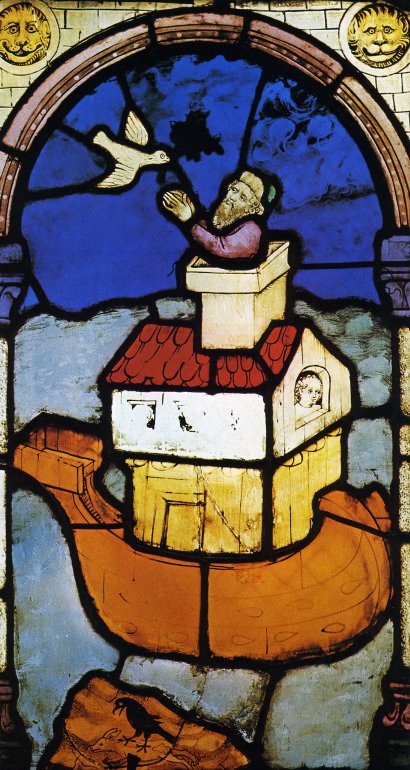 LEFT: a thematic window at Besserer
Chapel, Ulm; taken from
LEFT: a thematic window at Besserer
Chapel, Ulm; taken from
A Color Book of Biblical Myths,
Octopus Books, Ltd., London; © 1974
Here we see the typical view of
Noah receiving a dove carrying an olive branch in order to determine
if the flood waters
had receded enough to once again expose dry land. It appears to be a
curious story that has crossed many ancient cultures and literature.
There are some aspects of the Noah story that are pertinent to
Christians, however. As the name appears in the Old Testament, 'Noah'
means rest, remain. Old Testament names
often describe the major characteristic of the individual to which they
are attached. Therefore, one might surmise that Noah 'remained' through
the flood, and that is certainly true. Also we can say that Noah,
having been tossed on the stormy waters, came to 'rest' on Mount Ararat.
The Hebrew word for 'Noah' [transliterated Hebrew: N'Ch] is actually a
shortening of a longer word that might be spelled in English nôach
[noun], nûach
[verb] with the same meaning. Sometimes this form is prefixed and would
be transliterated into English as yânach; the meaning is
also expanded to mean allow to
stay, lay down and
even pacify and suffer.
Interestingly, this more or less holds true in Babylonian / Assyrian; nâhu, inûh means rest, etc.
The Babylonians had their own version of the 'flood epic' taken from The Gilgamesh Epic, tablet
XI. A cursory look at that source can expand our understanding of Noah,
the flood story in the Bible, and exactly just what might be the mystery of Noah.
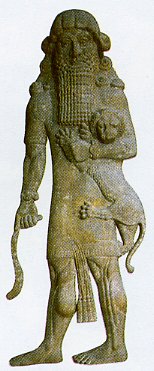 Gilgamesh was a Hurcules-type hero in Mesopotamia who
decided to find eternal life. In this version of the flood tale, the
Biblical Noah is called Utnapishtim,
which means roughly one who found
life; sometimes the Mesopotamians called this character Atrakhasis: the exceedingly wise.
Gilgamesh was a Hurcules-type hero in Mesopotamia who
decided to find eternal life. In this version of the flood tale, the
Biblical Noah is called Utnapishtim,
which means roughly one who found
life; sometimes the Mesopotamians called this character Atrakhasis: the exceedingly wise.
After many adventures Gilgamesh [pictured to the right] finds
Utnapishtim in a far off lonely place across the waters of death; the
narrative goes thus:
Gilgamesh
said to him, to Utnapishtim the Faraway:
I look upon you, Utnapishtim,
Your appearance is not strange; you
are like unto me;
My heart had regarded you as
prepared to do battle;
Yet you lie idly on your back!
How did you enter the assembly of
the gods,
And obtain life eternal?
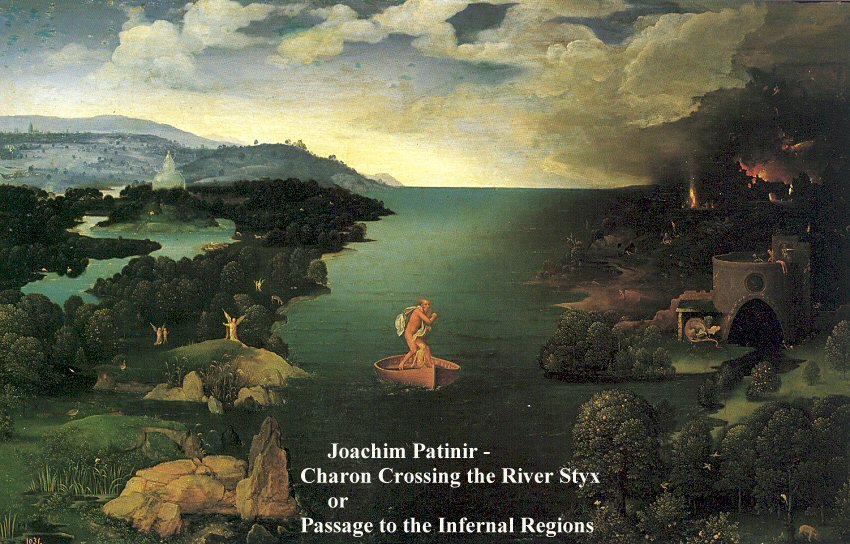 We should note the elements in this passage: the
Faraway, to lie down and eternal life. The name of the Noah figure in the
earlier Sumerian tales was Ziusudra,
which means roughly the one who
realized the life of distant days.
We should note the elements in this passage: the
Faraway, to lie down and eternal life. The name of the Noah figure in the
earlier Sumerian tales was Ziusudra,
which means roughly the one who
realized the life of distant days.
The idea of Gilgamesh crossing the 'waters of death' is reminiscent of
the classical myth of Charon ferrying souls across the River Styx to
the land of the dead. To the left we see one artist's rendering, with
'Heaven' on the left of the frame, the lands of the dead - or 'Hell' -
on the right. The figure of the boatman Charon dwarfs the mortal soul
in the bow of the boat. The luminescent structure in the middle left is
a heavenly fountain, covered by halcion skies and surrounded by angels.
In front of the gates of 'Hell' is Cerberus, the three-headed dog, and
dead bodies can be seen lying prostrate on the wall over the gates.
Fires of damnation darken the skies in the upper right.
In the Babylonian / Sumerian version with Atrakhasis as the central
figure, the pantheon of gods decides to destroy humankind because man
had become noisy and disturbed the divines' sleep [rest]. The destruction was to be
kept secret from humankind, but one deity decides to tell the Noah
character; in an amusing episode, and in order to not break the promise
to the other gods, he stands outside the favored one's house at night
and speaks
his warning to the wall: Reed hut, harken! Wall, consider! Tear
yourself down and build a
ship! A flood is coming!
After the flood, when the hero and his companions exit the ark, a
sacrifice is offered [Gen. 8:20-1]; the meaning of the Hebrew yânach
as pacify is brought out
in verse 21 which states: the LORD
smelled a sweet savour;
the
Hebrew for 'sweet' is transliterated nihoah [NIChCh or NIChOCh],
and could be translated as 'quieting, soothing or tranquilizing'. It is
used similarly in Ex 29:18 and Ezk 20:41. In the Utnapishtim version the
sacrifice is also described as a sweet
savour.
Another interesting parallel between the Old Testament flood-story and
the Gilgamesh Epic is the subject of nakedness;
in the Babylonian version, Utnapishtim sees Gilgamesh's nakedness and
tells the boatman who brought him to clad Gilgamesh in a garment.
There is also a bow in the
Babylonian epic, although it is a weapon fashioned by Enlil, one of the
chiefest of the gods who brought the flood, rather than a rainbow. The major gods
praised the workmanship of the bow, and Anu: kissed the bow ... and he named the names of the bow
... Longwood ... Accurate ... and Bow Star, for I have made it shine in heaven.
With these various elements established, let us deal with the statement
on the opening page about the Two
Witnesses of Revelation Chapter 11;
verse 3 states: I will give power
unto my two witnesses, and they shall prophesy; verse 4: These are the two olive trees and the
two candlesticks [see Zech 4:2-3 and next] ... verse 7: And when they shall have finished their
testimony, the beast ... shall over come them and kill them;
verse 8: And their dead bodies
shall lie in the street [or 'plaza'].
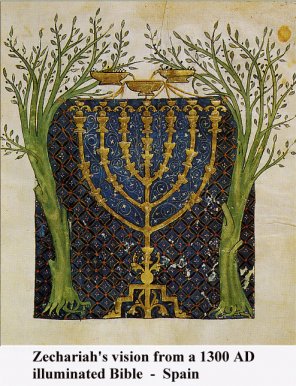 These passages may be mirrored in the Hebrew Old
Testament; for
example, Zechariah [above] 4:12-14: ... What be these two olive branches which
through the two golden pipes empty the golden oil out of themselves?
[13] And he answered me and said,
Knowest thou not what these be? And I said, No, my lord. [14] Then said he, These are the two
anointed ones, that stand by the Lord of the whole earth. [see
right -->]
These passages may be mirrored in the Hebrew Old
Testament; for
example, Zechariah [above] 4:12-14: ... What be these two olive branches which
through the two golden pipes empty the golden oil out of themselves?
[13] And he answered me and said,
Knowest thou not what these be? And I said, No, my lord. [14] Then said he, These are the two
anointed ones, that stand by the Lord of the whole earth. [see
right -->]
Likewise, Is 59:14 says: judgment
is turned away backward and justice standeth afar off; for truth is
fallen in the street [or 'plaza'],
and equity cannot enter. The Hebrew word for 'equity' is nekôchâh [NKChH];
the Hebrew word for 'afar off' is râchôq [RChOQ],
and the Hebrew word for 'street' ['a broad place' (see Mt 7:13)] is rechôb [RChB or RChOB].
The word for 'truth' is emeth
[EMTh], which comes from a root word that can mean 'to render firm, be quiet', or 'be at rest'.
The theme may
also be referenced in Is 14:6-7: he
who smote the people in wrath with a continual stroke, he that ruled
the nations in anger, is persecuted, and none hindereth. [7] The whole earth is at rest and is
quiet; they break
forth into singing. The Hebrew word for 'rest'
is noah [N'Ch]; the
word for 'quiet' is shâqat
[ShQT]; the word used for 'continual' is çârâh
[ÇRH] which is also used to mean 'apostate' or 'turn away' [see
Jn 6:66].
Zech 1:10-11 might be tied to this theme: These are they whom the LORD hath sent to walk to and fro through
the earth. [11] ... and
they answered ... and said, We have walked to and fro through the
earth, and behold, all the earth sitteth still, and is at rest.
The Hebrew word for 'sit (still)' in this instance is yâshab [YShB], and the
word for 'rest' is shâqat.
Jeremiah may also make reference to the Two Witnesses; 30:10 states: be not dismayed, O Israel; for lo, I
will save thee from afar
... and Jacob shall return, and shall be in
rest, and be quiet... Jer 46:27: I will save thee from afar off ...
Jacob shall return and be in rest
and at ease...
râchôq
is used for 'afar
off'
in these two passages. shâqat is used in both verses, the other
Hebrew word being shâan.
'Return' is shûb
[or shûwb], a
root word which has a broad variety of meanings; the most pertinent in
the present context is 'to turn back, return, continually, recover,
repent, rescue, reward'.
Perhaps pertinent also is Is 57:19-20: Peace, peace to him that is
far
off, and to him that is near, saith the LORD; and I will heal
him. [20] But the wicked are like the
troubled sea, when it cannot
rest... 'far
off' in Hebrew is râchôq,
and 'rest' is shâqat; 'peace' is shâlôm; the word
for 'near' - qârôb
- also means 'come nigh' [see next paragrapph].
Interestingly, 'wicked' is râshâ'
[RShA'], which may - or may not - imply Russia.
Jesus says that the final days of the age will be as the days of Noah.
In the Olivet discourse of Mt 24, verse 27, Jesus states: as the lightning cometh out of the
east, and shineth even unto the west, so shall also the coming of the
Son of man be. Verse 36 continues: But of that day and hour knoweth no
man, no, not the angels of heaven, but my Father only. [Verse
37] But as the days of Noe were,
so shall also the coming of the Son of man be. [Verse 38] For as in the days that were before the
flood they were eating and drinking, marrying and giving in marriage,
until the day that Noe entered the ark. [Verse 39] And knew not until the flood came, and
took them all away; so shall also the coming of the Son of man be.
Verse 38 raises questions; the activities described are mundane
everyday events that even Noah and his family practiced. The Greek
words of the text are not particularly revealing, although they can be
interesting. Eating in
Greek is trogo 'to
eat', even 'to gnaw or chew'; while its source is not certain, some
connect it to a word tribos
'a worn track' [see Mt 7:13]
in the sense of 'rub (together)'. This concept in Hebrew is derek 'a well trodden path',
also 'passenger' [see Ezk 39:11, 15]. This author believes derek to be one identity of
the present antichrist
[see Rev 11:2].
[Luke 17:27, however, uses a different Greek verb: esthío 'to eat,
devour, waste'.]
Drinking in Greek is pino 'to imbibe', and
metaphorically 'to drink up, absorb'. This might relate in this context
to the somewhat obscure Greek word pinos 'filth' [or pinarós].
Marry in Greek is gameo 'to wed', and giving in marriage is ekgamizo, which prefixes ek, a preposition meaning
'from, to, out' to gameo.
This Greek word is still seen in English today in words such as polygamy.
Remembering that Jesus did not speak in Greek, but in a Semitic tongue,
Verse 38 might be better understood translated into Hebrew. When used
in the context of eating and drinking
[Is 22:13], eating is âkal 'to eat, consume,
devour [see Ez 22:25 re: false prophets]', and likewise in Aramaic; the
Assyrian is akâlu.
In Ps 27:2 the word is used in relation to wicked enemies. Spelled
differently, but pronounced the same, is 'âqal 'to wrest or
wrong' but more at 'twist', and extended to 'aqalqal it means 'a winding
or crooked way' [see Ps 125:5].
In Is 22:13, drinking is shâthâh 'to
imbibe, be drunk' [likewise in Aramaic, the Assyrian being šatû], which is an
intensive form of shâqâh
'to cause to drink, drown'. As written in Isaiah, however, shâthâh may hint at shêth or Seth, third son of Adam. When shâthâh is pronounced as shêthâh it means
'buttock'. If shâthâh is hardened to sâtâh, it means
'to deviate from duty, to go aside', and points directly to sâtan 'to accuse,
attack' and sâtân
'Satan (the
adversary)'.
The best Hebrew word in our context for marry(-ing) is probably in Is
62:5: bâ'al
'marry, be master', and as a noun 'lord' - Baal, a pagan god. The
Aramaic is the same and is used to mean 'take possession of a wife';
the Assyrian is bâlu.
In Is 50:8 baal is
translated 'adversary' in the King James; in Dan 8:6 it is used in the
phrase with two horns. In
Mt 12:24 the element is used in the name Beelzebub.
However, there is another word for marry,
the same yâshab that was defined
above as 'sit (still)'; it
also means 'settle, remain, tarry'. While the Aramaic differs somewhat,
the Assyrian is ašâbu
'sit, dwell'. However, this usage of yâshab only occurs in Ezra and Nehemiah.
There are other aspects of Noah's name that attract attention; for
example, spelled similarly [in Hebrew] is nôahh [NHh], which
means 'lamentation, wailing'; spelled as nâhâh [NHH] it is
a verb 'to groan, wail' or 'cry aloud for an assembly'. As nâchâh [NChH] it
means 'to guide, govern
[see Ps 67:4],
straighten'. As nûa'
[NUA'] it means 'to waver, shake, cause to go up and down [as on a
wave], to and fro, wander
(up and down)'; from this latter derives nê'âh, nô'âh 'motion,
movement'. These concepts appear frequently in The Gilgamesh Epic,
although not necessarily in the same context.
Rev 18:15 may include some of these concepts in relation to the Great
Tribulation: The merchants of
these things, which were made rich by her, shall stand afar off for the fear of
her torment, weeping and wailing;
verses 9-10 mirror these elements: the
kings of the earth ... shall
bewail her, and lament for her ... [verse 10] Standing afar off ... Rev
14:11 states: ... they have no rest ... who worship the
beast and his
image ...
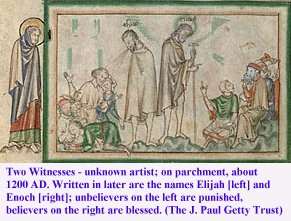 Also
reminiscent of the Noah story in the Great Tribulation is the
passage in Rev. 11:6 about the Two Witnesses: These have power to shut heaven, that
it rain not in the days of their prophecy; and have power over waters ...
verse 13 continues after the ascension of the Two Witnesses: And the same hour there was an earthquake ['waver,
shake'] ... and the remnant ['remain']
... gave glory to the God of
heaven [?'call out for an assembly'].
Also
reminiscent of the Noah story in the Great Tribulation is the
passage in Rev. 11:6 about the Two Witnesses: These have power to shut heaven, that
it rain not in the days of their prophecy; and have power over waters ...
verse 13 continues after the ascension of the Two Witnesses: And the same hour there was an earthquake ['waver,
shake'] ... and the remnant ['remain']
... gave glory to the God of
heaven [?'call out for an assembly'].
We read above in Is 59:14, 14:6-7,
Zech 1:10-11 and Chapter 4, also Jer
30:10 and Is 57:19-20 that the story of the Two Witnesses of
Rev Chapter 11 might be reflected in the Old Testament Scriptures.
Those passages - if pertinent - hint at two identities: Noah 'rest' and Shâqat
'repose, quiet' [?], also the hint of some possible names - Râchôq
'far off' as well as Qarob
'near' and Yâshab 'to be still, marry'.
In examining the name Noah
and related Hebrew words, we find such concepts as 'lamentation', 'cry aloud for an assembly', 'to guide, govern,
straighten' and 'to waver,
shake, cause to go up and down, [go] to and fro, wander'.
We might examine the story of Noah and the flood as a microcosm of
end-day events. Noah spent a period of time abuilding the ark; on his
600th year the flood began, perhaps reminding us of the 'six days' of
creation [Gen 1:31]. The flood lasted one year when G·d did not
have to 'strive' with the heart of evil men [Gen 6:3]; this could
represent the 'day' of G·d's 'rest', at the end of which [as Gen
8:1 states]: And G·d
remembered Noah...] Looking at the calendar page, we have
determined that we are now in the sixth
day of the present 'creation'; the Millennium of Peace represents
the seventh 'day' of 'rest'. During the 'storms' that brought the
flood, Noah and the ark were shaken
up and down, wandered
to and fro upon the waters and came to rest on a mountain.
If the 'Noah-spirit' is one of the Two Witnesses, then we would expect
him to 'enter the ark' during the stormy destructive period
of the rule of antichrist [I Pet 3:20: G·d
waited in the days of Noah, while the ark was a preparing...]; we would also expect him to return [remain] to 'rest' after the
'flood' subsides, meaning that he could help to govern and straighten the nations with
a rod of iron [Ps 2:9, Rev 2:27, 12:5, 19:15] during the Millennium of
Peace. Lamentation
might refer to the earth at the return of Satan following the thousand
years, or might refer to the trials that the Two Witnesses bring upon
the earth during the first half of the Great Tribulation.
The phrase 'cry aloud for an
assembly' might be reflected in Joel 1:14-15: ...call a solemn assembly ... into the
house of the LORD ... and cry unto the LORD, [15] for the day of the LORD is at hand, and as a destruction from
the Almighty shall it come. 'Call' in Hebrew is qârâ which also
means 'preach' and 'be renowned'; 'destruction' is shôd [or shôwd], probably the
name of a powerful demonic principality.
This theme appears also in Is 43:9-12: Let all the nations be gathered
together, and let the people be assembled: who among them can declare
this, and shew us former things? let them bring forth their witnesses,
that they may be justified: or let them hear, and say, It is truth.
[10] Ye are my witnesses, saith
the LORD, and my servant whom I have chosen:
that ye may know and believe me, and understand that I am he: before me
there was no G·d formed, neither shall there be after me.
[11] I, even I, am the LORD; and beside me there is no saviour.
[12] I have declared, and have
saved, and I have shewed, when there was no strange god among you:
therefore ye are my witnesses, saith the LORD, that I am God.
'Former things' in Hebrew is rîshôn
'first in time, of old time'; 'witness' is 'êd 'witness,
testimony', from a root 'ûwd
'to repeat', also
'call to record'; 'saviour' is yâsha',
the source of yêshû'âh
'Jesus' [Greek form]. 'Truth' is emeth [see above]. Both 'shew
us', 'shewed' and 'hear' in Hebrew are shâma' 'to (cause to)
hear' but also 'to witness';
this word may point to the name Shem,
a son of Noah; the name means 'name' or 'renown', and comes from a base
meaning 'honor, authority' or a 'mark of authority'.
Verse 16 continues: Thus saith
the LORD, which maketh a way in the sea, and a
path in the mighty waters. The Hebrew for 'way' is derek [see above]; the Hebrew
for 'path' is nâthîb
or nethîbâh,
also meaning 'to tramp' or 'a well beaten path'.
Traditionally it has been believed that the Two Witnesses will be Enoch and Elijah [see the graphic of
the parchment on the left above]. In Hebrew Enoch means 'initiated' or
closer to 'dedicated'; it derives from a root that means 'to narrow'
[see Japheth below]. Elijah in Hebrew means 'God
of Jah', but is interpreted as 'My God is Jah'. These two appear to be
logical candidates for the Two Witnesses because Enoch walked with G·d; and he
was not; for G·d took him [Gen 5:24]; and because Elijah went up by a whirlwind into
heaven [II Kings 2:11]. In other words, neither one experienced
death and the grave.
One hurdle encountered by this theory is found in Heb 11:5: By faith Enoch was translated that he
should not see death ... [The Greek word for translated is partly derived
from a base that duplicates the word theós 'G·d']
Rev 11:7 states clearly that the beast will kill the Two Witnesses; thus Enoch would have to taste
death.
Another hurdle is found in Mat 11:14 and 17:12-13 where Jesus implies
strongly that the spirit of Elijah
was in John the Baptist; therefore it might be claimed that Elijah also had tasted death.
Another theory is that the Two Witnesses are Moses and Elijah because they were both
able to control the rains and waters, as in Rev 11:6: These have power to shut heaven, that
it rain not in the days of their prophecy; and have power over waters
to turn them to blood ... Moses turned Egyptian waters
to blood in Ex 7:19, and in Ex 9:23 Moses sent hail [and fire],
and in verse 33 Moses
stopped the hail and rain. Likewise, in I Ki 17:1 Elijah said: there shall not be dew nor rain these [three] years, but according
to my word.
Both Moses and Elijah appeared on the Mount
of Transfiguration [Mat 17:3, Mk 9:4, Lk 9:30] - this after John the
Baptist had been killed [Mt 14:10-12]. Thus there could be some merit
to this theory.
However, this author believes that the Old Testament context, plus the
words of Jesus in Mat 24 [above], lends credibility to the idea of [the
spirit of] Noah being
one of the Two Witnesses. The identity of the other of the two is well
hidden, but this author believes it is likely [the spirit of] Moses. 'Rest' and 'repose' is
almost certainly points to the name Noah; 'peace' and 'quiet'
would seem to point to Shiloh
'tranquil, quiet', which would in turn appear to point to Moses [Gen 49:10].
Noah had three sons: Shem, Japheth and Ham. We dealt with the meaning
of the name Shem above.
Japheth means
'expansion' [see Enoch above], from a root pâthâ
'to open, enlarge', and by extension 'to simplify' also 'deceive'. The
name Ham [ChM] means
'hot', and there are many associated concepts in Hebrew, all of them
leading us to believe that - just as we know that Shem is the ancestor
of Christ - Ham is the
ancestor of the antichrist.
Ham [ChM] means 'hot',
and is associated especially with southern peoples as being 'swarthy',
especially Egypt [Ps
78:51]. This is extended to mean 'hot springs' in Hamath-dor [ChMmTh-DÔR,
Chammôth- Dôr]. Yet when 'Hamath' is rendered ChMTh [hamâth] it
means 'walled', also used as 'fortress' and is applied to the city of
Hamath in Syria. As pointed out above, wall also occurs in the
Gilgamesh Epic - albeit in a different context. The element wall as associated with Ham
may figure in such verses as Ezk 38:20 ... every wall
[hômâh, hamâth] shall
fall to the ground. Perhaps Paul had this association in mind
when he called the High Priest a 'whited wall' [Acts 23:3]: in other
words pure by outward appearance, but antichrist within.
In summation for this page, we quote Isaiah 30:15: For thus saith the LORD GOD, the Holy One of Israel: In
returning and rest shall ye be saved; in quietness and in confidence
shall be your strength... The Hebrew for 'returning' is shûbâh, which is
from a root shûb [or shûwb; see above].
'Rest' in Hebrew is nachath
[NChTh], which contains the word Noah [NCh]. Of course the
word for 'saved' in Hebrew is yasha',
which is the basis for the Greek name Jesus. The Hebrew for
'quietness' is shâqat
[see above variously]. 'Confidence' is bitchâh [BTChH], which
does not appear elsewhere in this commentary; it is translated
'assurance' in Is 32:17.
Return to Main Page


 LEFT: a thematic window at Besserer
Chapel, Ulm; taken from
LEFT: a thematic window at Besserer
Chapel, Ulm; taken from Gilgamesh was a Hurcules-type hero in Mesopotamia who
decided to find eternal life. In this version of the flood tale, the
Biblical Noah is called Utnapishtim,
which means roughly one who found
life; sometimes the Mesopotamians called this character Atrakhasis: the exceedingly wise.
Gilgamesh was a Hurcules-type hero in Mesopotamia who
decided to find eternal life. In this version of the flood tale, the
Biblical Noah is called Utnapishtim,
which means roughly one who found
life; sometimes the Mesopotamians called this character Atrakhasis: the exceedingly wise. We should note the elements in this passage: the
Faraway, to lie down and eternal life. The name of the Noah figure in the
earlier Sumerian tales was Ziusudra,
which means roughly the one who
realized the life of distant days.
We should note the elements in this passage: the
Faraway, to lie down and eternal life. The name of the Noah figure in the
earlier Sumerian tales was Ziusudra,
which means roughly the one who
realized the life of distant days. These passages may be mirrored in the Hebrew Old
Testament; for
example, Zechariah [above] 4:12-14: ... What be these two olive branches which
through the two golden pipes empty the golden oil out of themselves?
[13] And he answered me and said,
Knowest thou not what these be? And I said, No, my lord. [14] Then said he, These are the two
anointed ones, that stand by the Lord of the whole earth. [see
right -->]
These passages may be mirrored in the Hebrew Old
Testament; for
example, Zechariah [above] 4:12-14: ... What be these two olive branches which
through the two golden pipes empty the golden oil out of themselves?
[13] And he answered me and said,
Knowest thou not what these be? And I said, No, my lord. [14] Then said he, These are the two
anointed ones, that stand by the Lord of the whole earth. [see
right -->] Also
reminiscent of the Noah story in the Great Tribulation is the
passage in Rev. 11:6 about the Two Witnesses: These have power to shut heaven, that
it rain not in the days of their prophecy; and have power over waters ...
verse 13 continues after the ascension of the Two Witnesses: And the same hour there was an earthquake ['waver,
shake'] ... and the remnant ['remain']
... gave glory to the God of
heaven [?'call out for an assembly'].
Also
reminiscent of the Noah story in the Great Tribulation is the
passage in Rev. 11:6 about the Two Witnesses: These have power to shut heaven, that
it rain not in the days of their prophecy; and have power over waters ...
verse 13 continues after the ascension of the Two Witnesses: And the same hour there was an earthquake ['waver,
shake'] ... and the remnant ['remain']
... gave glory to the God of
heaven [?'call out for an assembly'].
